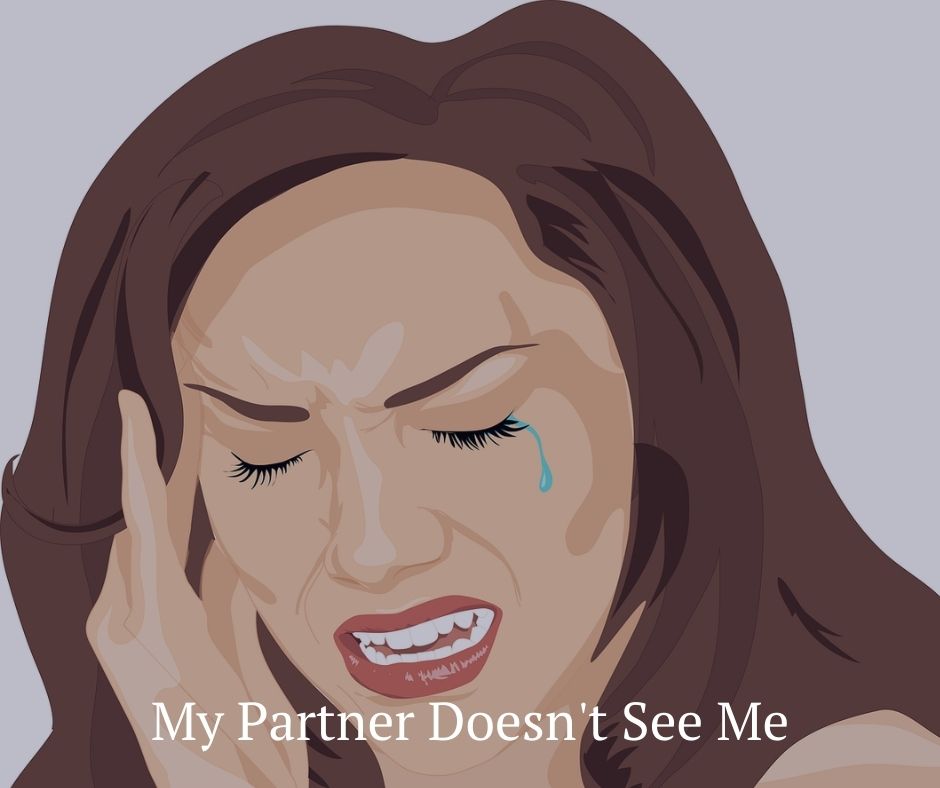My partner does not see me
Like other couples, Ingrid and her husband have different opinions on certain issues.
I am describing an actual incident. It is not about the occasion itself; it could just as well be any other.
In this case, the two disagree on the omnipresent topic of injections. However, they negotiated something like a “truce” and each acted according to their own decision.
Ingrid, with her decision not to have an injection, is now facing an enormous headwind from the outside with the tightened restrictive measures. So it is not surprising that she has an emotional low point, which she verbalized to her husband. What she needed was simply emotional support. To be seen with her momentary pain.
However, it ended up in a nasty argument with her husband and Ingrid was quite upset when she called me.
Her husband made comments from which you could tell that he didn’t notice her pain at all. He talked down her feelings. Obviously, he did not understand her situation one bit.
Ingrid was hurt, angry, sad, desperate, helpless. Everything at the same time. She did not feel seen.
She made her husband the perpetrator and herself the victim.
The two have known each other for more than 20 years. It was not the first scene of this kind. Therefore, it was already clear to her that he is just not able to see her the way she would like to be seen. But it hurt so much!
She just wanted to get out of the feeling, but couldn’t find a way. Because she had learned to solve problems always with her mind. Her mind went in circles.
This was about feelings and Ingrid didn’t like to allow them. All her life she has negatively evaluated feelings, which are considered weaknesses in her worldview.
So she was resistant to trying my recommendations. Her ego mind told her that it wouldn’t work.
Our ego prefers to keep us at the status quo, even when it doesn’t feel good. That’s what it knows. It doesn’t want to loose control.
It acquired patterns and beliefs in our childhood to protect us. They were quite appropriate at the time.
Today, however, as adults, we are in a different position and these old behaviors are often rather obstructive, as here with Ingrid, but they like to run on autopilot.
It takes a lot of attention to find out in which mode you are and the will to change it.
So what to do when the mind has the upper hand?
I recommended acknowledging her feelings first and not immediately turning on the “I rant about my husband and then I suppress the whole thing” mechanism.
In this case, it was important to me that she gets the feelings out of her body. The best way to do that is through movement. Be it walking, stomping, jumping, or hitting pillows with her fists and screaming. It is a matter of feeling inside oneself: which method is right for me in the given situation?
It was no use to persuade her any further. She was unwilling to act differently than she usually did.
The body stores our emotions
The next day I talked to her again.
I explained her that all emotions are stored in our body. If we suppress our feelings and do not process them, this can lead to physical pain and even illness.
Since Ingrid had already practiced being aware and conscious together with me, I was very pleased that she confirmed this. In fact, she noticed that this terrible feeling from the night before was spreading throughout her body. She described it as like putting a blob of paint in a glass of water and it spreading evenly everywhere.
It’s often hard to change decades of habits overnight.
Be patient and loving with yourself, as you would be with your toddler.
Sit with your emotions, look at them without digging deeper into them.
This acknowledging is exactly what Ingrid would have liked her husband to do.
